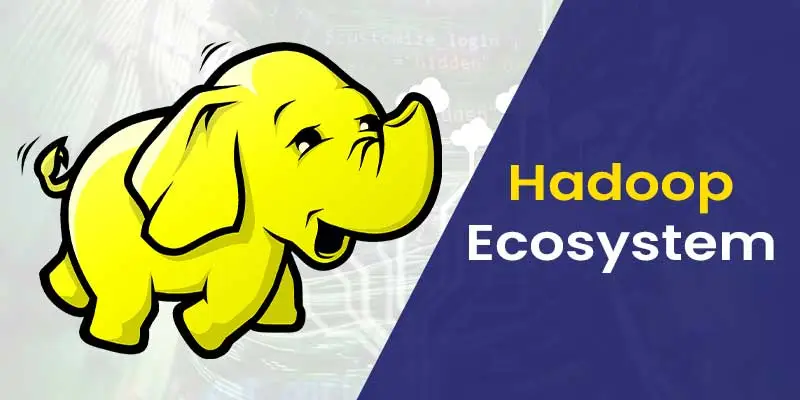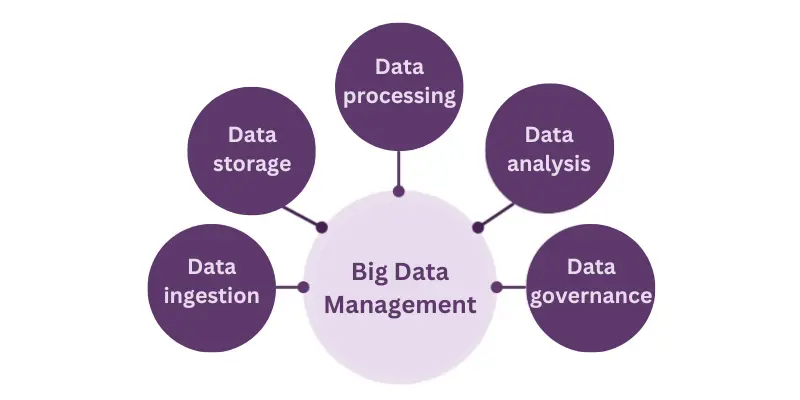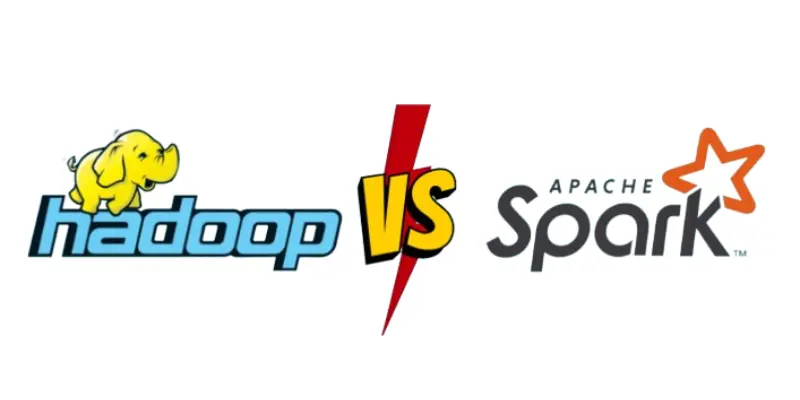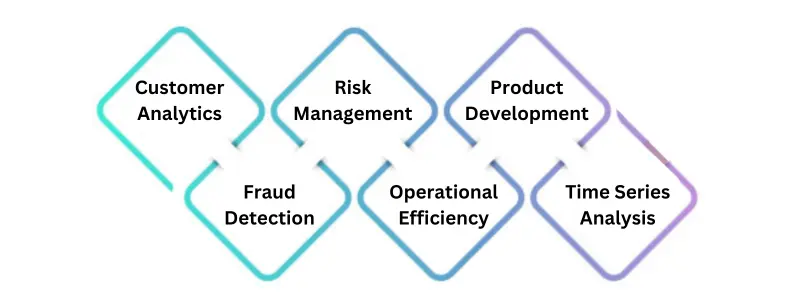
The digital age is awash in data like never before. Businesses are abundant with information from various sources, including customer transactions, social media interactions, sensor readings, and more. This vast amount of data, often called “big data,” presents challenges and opportunities for organisations.
While analysing and extracting insights from this data can be complex, the Hadoop ecosystem offers a powerful and versatile solution. It’s a collection of open-source tools and frameworks designed to handle large datasets’ storage, processing, and analysis efficiently and cost-effectively.
This blog delves into the critical components of the Hadoop architecture and their relevance in business development and analytics.
What is Big Data Management?

Big data management refers to the processes, practices, and technologies used to collect, store, organise, analyse, and protect large datasets. Managing big data encompasses various aspects, including:
- Data ingestion: Gathering and integrating data from various sources.
- Data storage: Storing large datasets efficiently and reliably.
- Data processing: Transforming and preparing data for analysis.
- Data analysis: Extracting insights and knowledge from data.
- Data governance: Implementing policies and procedures to build a data security and privacy framework.
Benefits of Managing Big Data
Effectively managing big data is crucial for organisations to:
Gain deeper customer insights
Understand customer behaviour, preferences, and needs to improve products, services, and marketing campaigns. Analysing customer purchase history can reveal trends and preferences, allowing businesses to personalise recommendations and optimise marketing strategies.
Optimise operations
Analysing operational data can improve efficiency and reduce costs. For example, analysing production data with the Hadoop ecosystem can identify areas for improvement and streamline processes, leading to cost savings and boosting efficiency.
Make data-driven decisions
Analysing data to predict trends, patterns, and opportunities leads to informed business decisions. For instance, analysing sales data can reveal which products are performing well and which need adjustment, allowing businesses to optimise their product offerings.
Gain a Competitive Advantage
Differentiate themselves in the market by leveraging the power of data. For instance, analysing social media data can reveal customer sentiment and emerging trends, allowing businesses to stay ahead of the competition.
An MBA in Business Analysis equips students with the skills and knowledge to handle the challenging field of big data management. By understanding the processes, practices, and technologies involved in collecting, storing, organising, analysing, and protecting large datasets, graduates can leverage this valuable information to gain deeper customer insights, optimise operations, make data-driven decisions, and ultimately gain a competitive advantage for their organisations.
What is Hadoop Ecosystem?
The Hadoop ecosystem is a set of open-source tools and frameworks designed to manage and analyse big data. It provides a distributed computing platform that can manage big datasets across multiple nodes in a cluster. This allows for parallel processing and efficient data analysis, making it ideal for big data management tasks.
Core Components of Hadoop Architecture
The Hadoop ecosystem comprises several critical components, each serving a specific function:
Hadoop Distributed File System (HDFS)
- HDFS is the foundation of the ecosystem, providing a distributed file system for storing large datasets across multiple nodes in a cluster.
- It offers scalability, fault tolerance, and high availability, ensuring data accessibility even if individual nodes fail.
- HDFS facilitate the breakdown of large files into smaller blocks and distributes them across the cluster, enabling parallel processing and efficient data retrieval.
YARN (Yet Another Resource Negotiator)
- YARN is responsible for resource management within the Hadoop architecture.
- It allocates resources like CPU, memory, and network bandwidth to different applications running on the cluster, ensuring efficient utilisation and preventing bottlenecks.
- YARN provides a flexible framework for running various processing frameworks, including MapReduce and Spark.
MapReduce
- MapReduce is the original processing framework in Hadoop architecture, designed for batch processing of large datasets.
- It breaks down complex tasks into smaller, independent “map” and “reduce” functions that can be executed parallel across the cluster.
- MapReduce is ideal for data aggregation, sorting, and filtering tasks, making it a valuable tool for analysing large-scale datasets.
Spark
- Spark is a newer processing framework that offers significant performance improvements over MapReduce, particularly for iterative and interactive data analysis.
- It leverages in-memory processing and distributed caching to achieve faster execution times and enables real-time data processing capabilities.
- Spark is increasingly popular for machine learning, graph processing, and streaming data analysis, making it a powerful tool for modern data science and analytics within the broader Hadoop ecosystem.
Hadoop Ecosystem vs. Spark Ecosystem

Both Hadoop and Spark are open-source ecosystems for big data, but they have some key differences:
| Feature | Hadoop | Spark |
| Processing Model | Batch processing | Real-time & iterative processing |
| Data Storage | HDFS | HDFS, Cassandra, HBase |
| Programming Model | Java (MapReduce) | Java, Python, Scala |
| Use Cases | Large-scale data analysis, ETL, Data warehousing | Real-time analytics, Machine learning, Streaming data applications |
Choosing between Hadoop and Spark depends on each business’s specific needs and data characteristics.
The skills you gain from working with big data, like data analysis and problem-solving, are highly sought-after in various fields, including business. If you are aiming to leverage your data expertise in a leadership role, consider pursuing an MBA. Utilize online resources to look for MBA Coaching Near Me and find the ideal program to refine your business acumen and propel your career forward.
What is Hive in Hadoop Ecosystem?
Hive is a data warehousing solution developed on top of the Hadoop ecosystem. It provides an SQL-like interface for querying and analysing data stored in HDFS. It familiarises users with traditional database systems and enables them to analyse large datasets using SQL queries.
The Hadoop ecosystem extends beyond the core components with a diverse set of tools and frameworks, and one such platform is PIG,
A platform that uses Pig Latin, a high-level scripting language, for the processing, analysing, and managing big data. It’s handy for complex data transformations and ETL (Extract, Transform, Load) processes. Pig allows more complex data manipulation and transformations than Hive’s SQL-like interface.
What is Hadoop in Big Data?
Hadoop offers several advantages for big data management in business:
- Flexibility: The Hadoop ecosystem offers various tools and frameworks for data processing and analysis needs. From batch processing with MapReduce to real-time analytics with Spark and data warehousing with Hive, big data Hadoop provides a versatile platform for various significant data use cases.
- Open-source: Being open-source, Hadoop provides greater flexibility and customisation compared to proprietary solutions. The open-source nature allows for community contributions, continuous development, and customisation to specific needs.
- Scalability: The distributed nature of Hadoop architecture allows it to scale easily to accommodate growing data volumes. Adding extra nodes to the cluster can improve processing power and storage capacity.
- Cost-effectiveness: Hadoop leverages commodity hardware, making it a more affordable solution than traditional data storage and processing systems. Open-source software and readily available hardware make Hadoop a cost-effective option for big data management.
If you’re passionate about big data management and want to leverage its power to drive business success, consider pursuing MBA Courses in Chennai with a specialisation in Business Analytics. These courses can train you with the skills to handle the complexities of big data management, derive valuable insights, and make data-driven decisions that benefit organisations.
Beyond Hadoop
While Hadoop is a powerful tool for big data management, it’s not a one-size-fits-all solution. Other technologies, such as NoSQL databases, cloud-based platforms, and streaming analytics tools, are increasingly important in big data management.
Applications of the Hadoop ecosystem
- Customer Analytics: Analyse customer behaviour, preferences, and purchase history to identify trends, personalise marketing campaigns, and improve customer engagement.
- Fraud Detection: Analyse large datasets of transactions to identify suspicious patterns and prevent fraudulent activity.
- Risk Management: Analyse historical data and market trends to assess potential risks and make informed business decisions.
- Operational Efficiency: Analyse data to identify bottlenecks, optimise processes, and improve resource allocation.
- Product Development: Analyse customer feedback and market trends to inform product development and enhance product offerings.
- Social Listening: Businesses can leverage NLP within the Hadoop ecosystem to analyze vast amounts of social media data. By processing customer reviews, comments, and social media posts, NLP can extract sentiment, identify emerging trends, and uncover valuable insights into customer needs and preferences.
In the realm of big data, Natural Language Processing (NLP) plays a crucial role in extracting valuable insights from text data. To delve deeper into this fascinating field, be sure to check out our previous blog, “How NLP Uses Different Types of Analytics for Business Growth.” This blog explores the various analytical techniques employed by NLP, and how businesses leverage them to unlock hidden potential within customer reviews, social media conversations, and more. Understanding how NLP empowers businesses to analyze text data gives you a broader perspective on how big data analytics can fuel growth and success.

These are just a few examples of how big data Hadoop empowers businesses to extract valuable insights from their data, improving decision-making, enhancing operational efficiency, and gaining a competitive advantage in the digital age.
If you’re interested in learning more about big data and its applications in business, consider pursuing a Business Analytics degree at one of the Top MBA Colleges in Chennai. These programs provide a comprehensive curriculum that equips students with the skills and knowledge needed to succeed in the data-driven world.
Hadoop in Business Analytics
Big data management is a complex but critical challenge for modern businesses. The Hadoop ecosystem provides a powerful and cost-effective solution for handling large datasets and extracting valuable insights. By understanding the components, benefits, and limitations of Hadoop architecture, businesses can leverage its capabilities to gain a competitive edge in the data-driven world.
If you are interested in understanding the capabilities and limitations of the Hadoop ecosystem, an MBA in Business Analytics in Chennai should be your go-to option for navigating the world of big data. This knowledge will empower them to leverage the power of data for informed decision-making and contribute significantly to the success of data-driven organisations.

